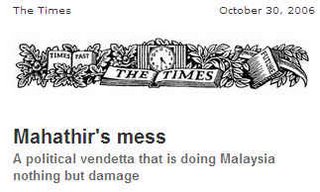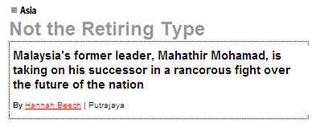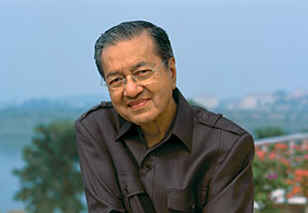TIMES (UK): MAHATHIRS MESS-Political Vendetta Damages; TIME ASIA: Dr MAHATHIR's FEUD with ABDULLAH; His LEGACY; Developing World Needs a CHAMPION
 Mahathir's mess
Mahathir's messA political vendetta that is doing
Malaysians with a sense of humour may be entertained by Mahathir Mohamad's
belated enthusiasm for clean government and outspoken democratic debate. In his 22 years as their prime minister, the prickly Dr Mahathir was not noted for his tolerance of criticism, constructive or otherwise. Newspapers toed the government line or soon found themselves in difficulty, and judges whose rulings were not to Dr Mahathir's liking were unceremoniously dismissed.It was an open secret that his method of governing combined strong state intervention with complex patterns of political patronage, but curiosity about the lucrative business opportunities enjoyed by his sons and specially favoured associates was robustly discouraged. Anwar Ibrahim, the deputy he initially groomed to succeed him, spent years in prison on trumped-up charges for daring to say publicly that corruption had reached critical dimensions.
How things change. Having reluctantly relinquished the reins of power three years ago, Dr Mahathir has done with such taboos. Claiming that he is "saving the nation from disaster", he has launched streams of unproven and damaging allegations against Abdullah Ahmad Badawi, his successor as Prime Minister. These include nepotism, incompetence and even selling out the country - this last because of the sensible decision to cancel a pet Mahathir mega-project, a somewhat pointless bridge that would have gone only halfway across the Johore Strait between Malaysia and Singapore Datuk Badawi not only has done nothing to prevent him having his say but also, after months of suffering his sniping with dignified calm, invited him a week ago to his official residence for a "peace meeting" with no one else present. There, for nearly two hours, he dutifully took notes as Dr Mahathir listed his grievances. The courtesy was ill-rewarded; the very next day, Dr Mahathir called a press conference to announce that he was the victim of a "police state" that had "taken away" his civic rights. This is no joking matter. The problem is not unfamiliar. Dr Mahathir admits that he considered Datuk Badawi "harmless" - in other words, content to take dictation. He is hardly the first political leader to be appalled by the discovery that apparently docile protégés can develop a mind of their own once installed in office, or the first to take that revelation badly. Baroness Thatcher's disillusion with John Major comes to mind.
But Dr Mahathir has gone far beyond mutterings of discontent. He denies it, but it is by now obvious that he is openly campaigning to replace Datuk Badawi, who won a landslide electoral victory only two years ago, with Najib Razak, the deputy prime minister whom he publicly regrets not having chosen for the top job.
= = = = = =
 TIME
TIME  Malaysia's former Prime Minister Mahathir Mohamad is 81 years old, but he was as combative as ever when he met recently with TIME's Hannah Beech and Baradan Kuppusamy in his plush office in
Malaysia's former Prime Minister Mahathir Mohamad is 81 years old, but he was as combative as ever when he met recently with TIME's Hannah Beech and Baradan Kuppusamy in his plush office in
TIME: How will historians regard your 22 years as Prime Minister?
Mahathir: They would have noticed an acceleration in industrialization. The previous Prime Ministers had the same ideas. But they were unable to push it. When I became Prime Minister, I found ways and means to accelerate the process. So I suppose that period of very rapid [economic] growth from the 1980s to 2000 will be identified with me.
How do you compare that era with what's happening now?
[Abdullah] has discarded the policies and strategies we used during my time, claiming that they were not good for the country, particularly what were termed "megaprojects." We used the megaprojects to stimulate the economy. They put a stop to them, and when you put a stop to spending money, you don't generate wealth anymore ... I expect every Prime Minister to have his own imprint. [Abdullah] wants to be recognized as himself and not as a copy of somebody else. But when you try to do that, you may do better things or you may do worse things.
Downstairs you have a poster listing some of your accomplishments. Most are structures like Putrajaya and
Everything in the last 20 years has been my pet project, so if you touch anything, it's going to be touching my pet project. [But] all these things that I caused to be built are actually essential to this country. We need the infrastructure, we need Putrajaya. Imagine what
Looking back on your anointed successors, it seems they all disappointed you. Are you bad at choosing good leaders?
I'm not very good at it. I assume that people react to things as I would react. For example, if you are nice to people, they should be nice to you. If somebody is going against you, yet you are willing to forget and forgive and give them a place again in the government, they will be very grateful. But I find that the people I helped to reach certain heights actually turned against me.
Do you think Prime Minister Abdullah is ungrateful to you?
At least he should have noticed that I went out of my way to give him an opportunity.
Is he more afraid of dissent than you were?
He has made UMNO his personal party. They cannot say anything that he doesn't approve of. I'm being told, look, you mustn't criticize the Prime Minister because he is an institution, he is an UMNO president and therefore an institution. Yes, the UMNO president is an institution, but the incumbent is not. When I was there, he challenged me. Now he's not allowing anybody to say a word against him ... What I don't like is creating what would be called a police state. Nobody is allowed to organize any meeting and invite me to speak. If you do, the police call you up.
As
How do you view the Bush administration's efforts to build democracy in Iraq and Afghanistan?
Democracy must be internally generated. You cannot force it from the top—it's not going to work.


0 Comments:
Post a Comment
<< Home